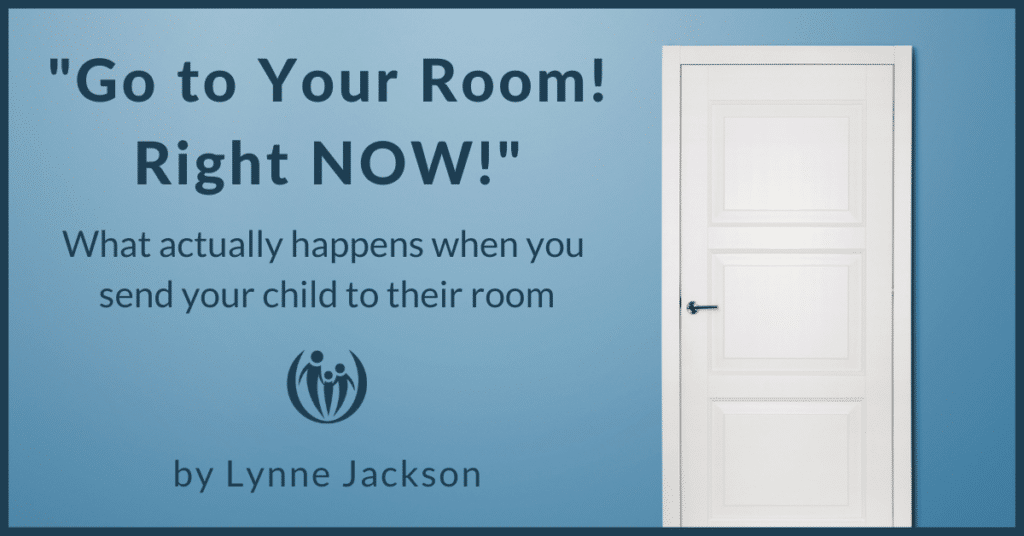
“Go to Your Room! Right NOW!”
What actually happens when you send your child to their room

“Go to your room!” is a common command when kids have misbehaved. You want to “be the parent” after all, and this directive buys you some time to think of a consequence. And it might even calm your child down!
But even if your child complies, they may be feeling controlled, rejected, and might be growing resentful. You feel stuck, and wonder how this dynamic will look when they are teenagers. Or maybe they are teenagers and it’s not pretty.
To get unstuck from this pattern, it helps to understand what it’s like to be your child. How would you feel if you, as an adult, were angrily sent to your room? Ashamed, intimidated, powerless, rejected, and defeated? Misunderstood and seething under the surface?
The unintended messages your child might receive
Here are a few possible unintended messages your child hears when you command “Go to your room!”
- “Child, you’re a problem!”
- “Your feelings don’t matter.”
- “I only want to be with you if you are calm and pleasant.”
These messages tend to foster shame, resentment, and resistance in our kids.
Lou and Maria had come for coaching because of the frequent, strong disrespect from their intense 5-year-old son Aidan. This was often followed by his refusal to take a break in his room. All they could relate to was the frustration they felt toward Aidan in these conflicts, so I made this analogy:
“Imagine that you just got a new job, and you are a little overwhelmed. You make some mistakes, and your boss is obviously irritated. You do your best to communicate with her about it, and she firmly interrupts you by saying, ‘Go to your office!’”
Lou and Maria’s expressions softened, and Lou agreed, “That helps me understand.”
Then I said, “Fast forward 10 years when your son is in his teens. If you command, ‘Aidan, you can’t talk to me that way! Go to your room!’ even if he does go, what’s going on in his heart?”
“It’s exploding!… He’s outraged.” they agreed.
I added, “And he may be texting his friends what he really feels.”
Fueled by this new insight, Maria stated, “I want to stop my harsh confrontation of this behavior because it will only make it worse.”
Consider this: if your kids were fully aware of their feelings and had the freedom to be totally honest, what might they say to you about being sent to their room?
An alternative to sending your child to their room
As we shifted toward a solution, I asked Lou (who was the parent working outside the home) what a truly helpful boss would do with someone struggling at their job. Lou answered thoughtfully,
“They’d try to identify what you aren’t understanding or what skills you need to develop, or what resources you need. They may sit with you themselves or find someone to help you.”
I continued, “And they would probably encourage you when they see a little bit of progress.”
“I get it, but what do we do?” implored Maria. As the parent facing this challenge day in and day out at home, the task felt daunting. “He becomes unmanageable and blames others for the conflict and just gets angrier! I need concrete tools to help me!”
I set up a roleplay to illustrate practical ways to calm down and empathize to help set a new course. Maria played her son, and I played a parent in an escalating conflict. “You’re mean!” she fired at me, and then used Aidan’s go-to punch: “You don’t love me!”
I took a deep breath and answered. “Wow, those are some strong words. You’ve got some big, angry feelings, and those words make some hurt feelings in me too. My brain’s not going to work well for me right now, and yours probably won’t either. Let’s both take a little break so we can solve this.”
Lou and Maria both agreed that it felt much better and would provide the opportunity to empower their son to express his intense feelings more respectfully.
Focusing on helpful, not hurtful, messages
If you can solve a conflict without sending your child to their room, that’s optimum but not always doable. Maria and Lou reported that sometimes their son still benefited from cooling off in his room. And they, as the parents, benefited from the extra time to cool down themselves. When this was necessary, they focused on communicating helpful, not hurtful, messages. When he returned, they would guide him in processing his difficult feelings.
If your child struggles with explosive reactions or hurtful words, you can minimize the hurt and maximize your child’s learning.
- Model: Take breaks in your room, in a quiet spot, or even go on a walk when you are upset. Talk about the benefit to you and the child to whom you are responding.
- Invite: When your child is losing control, “Please find a nice spot to take a break, and then we’ll talk about this problem when we’re both calmer.” This communicates caring instead of shaming messages. Note: for some kids, this might be in their room. For others, it might be on a couch, a comfy chair, or a special Calm Down Corner.
- Affirm: If your child comes back calmer, help him to feel really good about his choice and how helpful and mature it was.
What does this approach look like over time?
Almost a year later, Maria reported that she was learning to truly value Aidan’s intense feelings as an important part of their “invigorating family culture!” She also noticed that with their shift in approach, their interactions have been gradually equipping Aidan to better understand his feelings and monitor his intensity.
Fast forward that approach ten years, and it certainly paints a very different picture: one of an intense teenager working conflict out with his parents in a way that keeps their relationship connected and strong. In addition, it prepares him for life on his own, with all the relational challenges it will hold!
And that is what this is all about – not just figuring out how to change your pattern of sending kids to their room but elevating grace-filled reconciliation. The type of reconciliation that values calming down and working things out so you can still be connected and respectful when things are tough.
1 Peter 3:8-9 (The Message) says, “In summary: Be agreeable, be sympathetic, be loving, be compassionate, be humble. That goes for all of you, with no exceptions. No retaliation. No sharp-tongued sarcasm. Instead, bless—that’s your job, to bless. You’ll be a blessing and also get a blessing.”
What are your parenting strengths?
You’ve got them. Knowing your strengths will help you become the best parent you can be. Knowing your parenting challenges is useful information too. Take our FREE ASSESSMENT.






